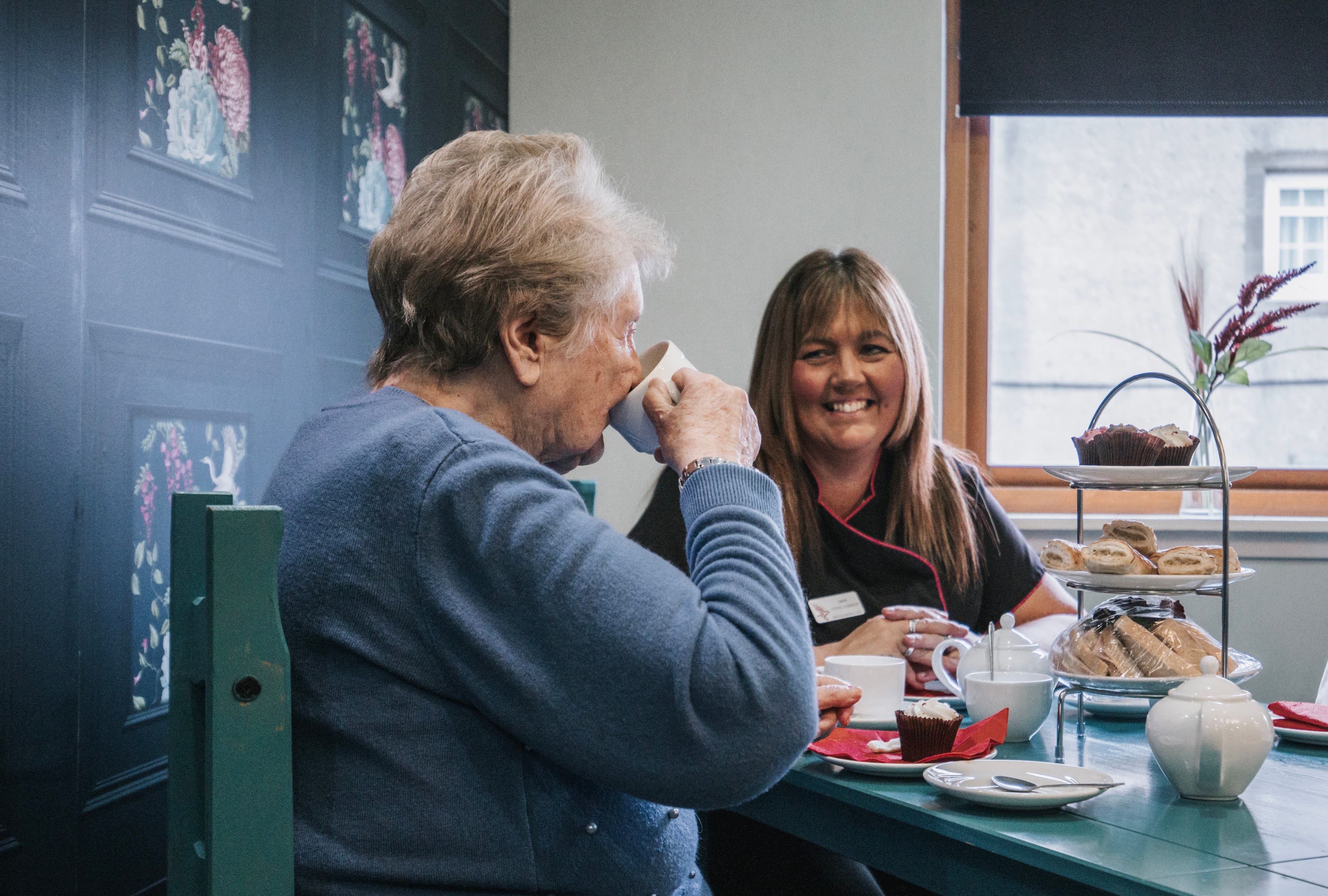Arrange care at home
Simply fill out our questionnaire and we'll send you a list of personalised recommendations.
Used by over
18,000 families every month

How Lottie helps you arrange trusted home care
Instantly connect with vetted home care providers in your local area.

1
Personalise your search
Tell Lottie your care needs, wants and budget, as well as your preferred location and estimated start date.

2
Compare care providers
Lottie will send you a tailored shortlist with your most compatible care services and providers with carer availability.

3
Select your care service
Lottie’s handpicked providers will contact you to discuss your care requirements care needs in further detail.





Start your home care search today!
Please enter your postcode below to compare home care agencies in the UK
Types of home care explained
We know that choosing the right home care is an important decision. We're here to help you find trusted, high-quality care tailored to your needs.

Hourly Care
Carers visit at set times each day to help with daily tasks and provide friendly companionship. Ideal for people who want flexible support while staying independent at home.

Live-in Care
A carer lives in your home to give full-time support. Ideal for people who need ongoing care but want to stay in their own home.

Overnight Waking Care
A carer stays awake all night to offer support when needed. Ideal for people who need regular help overnight, such as with using the bathroom, moving around, or reassurance.
Browse home care across the UK
- Home Care in London
- Home Care in Leicester
- Home Care in Wolverhampton
- Home Care in Nottingham
- Home Care in Sheffield
- Home Care in Leeds
- Home Care in Edinburgh
- Home Care in Bristol
- Home Care in Coventry
- Home Care in Luton
- Home Care in Glasgow
- Home Care in Colchester
- Home Care in Milton Keynes
- Home Care in Eastbourne
- Home Care in Southampton
- Home Care in Stoke-on-trent
- Home Care in Dorset
- Home Care in Birmingham
- Home Care in Derby
- Home Care in Cheltenham
- Home Care in Kent
- Home Care in Worcester
- Home Care in Surrey
- Home Care in Bedford
- Home Care in Chester
- Home Care in Portsmouth
- Home Care in Oxford
- Home Care in Exeter
- Home Care in Essex
- Home Care in Hampshire
- Home Care in Devon
- Home Care in Norfolk
- Home Care in Berkshire
- Home Care in Buckinghamshire
- Home Care in Bedfordshire
- Home Care in Cumbria
- Home Care in Suffolk
- Home Care in Yorkshire and the Humber
Looking for a specific provider?
Home care services available across the UK
Domiciliary care
Also known as hourly care, this involves carers attending someones home to provide assistance to individuals at specific times of the day..
Live-in care
Live-in care is a great option for anyone who needs 24-7 support. The live-in carer can help with daily tasks and take care of all your needs.
Respite care
Care provided for a specific period of time, often to give caregivers relief or to help someone recover post an operation.
Specific care available
Companion Care & Household Support
- Admin Support
- Companionship/Social Interaction
- Gardening
- Housekeeping
- Laundry
- Meal preparation
- Pet Support
- Shopping and Errands
- Transportation
Personal Care
- Bathroom Assistance
- Continence Care
- Drinking and/or feeding
- Oral medication support
- Washing and/or dressing
Moving & Handling
- Hoisting
- Sara Stedy
- Transferring
- Turning
Specialist care services
- Alcohol / drug misuse
- Alzheimer's
- Cancer care
- Catheter care
- Challenging behaviour
- Dementia (early stage)
- Dementia (late stage)
- Hearing Impairment
- Intravenous drugs
- Learning disability (e.g. Autism)
- Mental health
- Overnight care
- Palliative care
- Parkinsons disease
- PEG Feeding
- Physical disability (e.g. Cerebral Palsy)
- Rehabilitation post surgery
- Sight Impairment
- Speech Impairment
- Stoma care
- Stroke
- Wound dressing
Average home care costs in the UK
Average cost of domiciliary (hourly) care
£28per hourAverage cost of live-in care
£1,596per weekAverage cost of overnight waking care
£244per nightAverage cost of overnight sleeping care
£187per night
Testimonials from Lottie's care seekers
Choosing the right home care option is a big decision, and we’re here to support you - just like we have for many others. See what they have to say…
Katy understood what I needed for home care and found the right company. They arranged a care assessment. A relief during a pressured time.
Ann
8th April 2025
Hannah helped with grandma’s home care. Her support took a weight off. Invaluable service for anyone needing senior care.
Sophie
22nd February 2024
Lottie is the 1st organisation I have come across who have been willing to understand and help.
Jacqueline
23rd January 2025
Fantastic advisor, who clearly knows the hurdles and issues that need navigating, and was extremely understanding and sympathetic. Brilliant service!
Paul
15th January 2025
Eva paves the way with compassion, diligence and deep knowledge of the care sector. And for that we will be forever grateful.
Louise
17th December 2025
Got info from 5 providers fast. Three phoned me the next day. Lottie followed up with tips for care assessments. Highly recommend.
Cathy
28th November 2024
Absolutely amazing service. Couldn't have asked for more support. Thanks so much Eva you've made such a difference to what could have been a really stressful...
Stuart
12th November 2025
Frequently asked questions about home care services
Is live-in care cheaper than a care home?
In many cases, live-in care can be more cost-effective than a care home, especially for couples. With live-in care, you pay for one carer to support both individuals at home, whereas a care home charges for two separate placements. While the exact cost of home care depends on the level of care required and the provider, the average cost of home care (based on 5 hours a week) comes to £135 per week, while the average cost of a residential care home is £1,406 per week.
Why choose home care over a care home?
There are many advantages to choosing home care over moving into a care home, particularly in terms of flexibility, comfort, and staying close to loved ones.
- Stay in familiar surroundings: Remaining at home with loved ones, personal belongings, pets, and memories reduces confusion and anxiety, especially for those living with dementia.
- Tailored, flexible care: Receive care designed around individual needs, from occasional support to full-time live-in care, with the ability to adjust as needs change.
- Maintain independence and routine: Maintaining familiar routines, including mealtimes, activities, and hobbies, promotes independence and wellbeing.
- Dedicated, one-to-one support: Benefit from personalised, focused care in the comfort of your own home.
- Cost-effectiveness: Pay only for the care needed, with live-in care often being a cost-effective alternative to a care home for those needing round-the-clock support.
How are home carers assigned? Can I choose my own carer?
Yes, you are able to choose your own carer if you go straight to a carer rather than through an agency. If you choose an agency, you will be matched with a carer with the agency’s help. While each agency's exact process differs, most have a thorough system to ensure the best match for the person being cared for. After assessing your care needs and understanding medical conditions, personal needs and daily routine, they’ll match the carer based on experience, personality and any language or cultural preferences. Lottie’s Care Experts can help you decide which route is best for you - just complete our personalised, free home care shortlist.
Can home care be arranged quickly or in an emergency?
Yes, many providers offer urgent or same-day care in cases such as hospital discharge, sudden illness, or a family carer being unavailable. Availability depends on the agency and location, so it’s best to contact them as soon as possible.
Can I get free care at home?
Yes, in some cases, you can receive free care at home through the NHS or your local council. Here's how:
NHS continuing healthcare (CHC): If you have a severe, complex, or unpredictable health condition, the NHS may fully fund your care at home, covering medical, personal, and nursing care. Learn more about NHS Continuing Healthcare.
Free home adaptations & equipment: If you need essential equipment or small home adaptations (under £1,000), your local council must provide them for free. This includes grab rails, stair rails, and walking aids. Larger adaptations can also be provided through the Disabled Facilities Grant.
Free care after hospital discharge: You may qualify for up to six weeks of free home care after a hospital stay to help you regain independence. Services include carer support, mobility aids, and home adjustments.
How to Apply?
- CHC funding - Ask a GP, nurse, or social worker to arrange an assessment.
- Home adaptations - Contact your local council for a home assessment.
- Care after hospital - If eligible, hospital staff will arrange support before discharge.
What qualifications or checks do home carers have?
All professional home carers must pass a Disclosure and Barring Service (DBS) check before they’re allowed to provide care. Most carers also hold care-specific qualifications, such as NVQs or Diplomas in Health and Social Care, and complete regular training in areas like personal care, medication handling, dementia, and safeguarding.
At Lottie, we only list home care agencies that have been carefully vetted by our team before being added to our marketplace, so you can feel confident you're choosing from trusted, experienced care providers.
What’s the difference between hourly, overnight and live-in home care?
The key difference is how often care is provided and how present the carer is in your home:
- Hourly care gives flexible support during the day, such as help with getting up, preparing meals, medication, or companionship.
- Overnight care supports you through the night. This can mean two things: a carer who sleeps in your home in case help is needed; or someone who stays awake to provide ongoing support.
- Live-in care means a carer stays in your home full-time, offering round-the-clock help, usually on a rotating schedule.
All of these options can be tailored around your daily routines, personal preferences, and the level of care you need.
Can home care support both short-term and long-term needs?
Yes, home care is highly flexible and can be arranged for either short or long periods of time. Some people use it for a few weeks after a hospital stay, during illness, or while family carers take a break. Others arrange long-term support for ongoing conditions, mobility challenges, or day-to-day personal care. One of the benefits of home care is that it can be adapted over time — increasing or decreasing as needs change.
Do I need a care needs assessment to get home care?
No — you don’t need a care needs assessment to arrange home care privately. A care needs assessment is only required if you're applying for financial support from your local council. This free assessment looks at your day-to-day needs and helps determine whether you qualify for funded care. If you’re ready to arrange home care now, you can save time on comparing local home care agencies yourself and simply request a free shortlist of trusted agencies through Lottie.
Can home care help with recovery after illness or surgery?
Yes, home care can be vital to recovering well at home after an illness, injury, or hospital stay. This type of care - sometimes known as post-operative care - is usually short-term and focuses on supporting recovery with tasks like washing and dressing, medication reminders, meal preparation, and mobility. Home care after a hospital stay, injury or illness can also provide emotional support and reassurance during what is often a vulnerable time. It’s a practical alternative to staying in hospital longer and can help you regain independence at your own pace — with support that adapts as you recover.
Is live-in care a good alternative to residential care?
For many people, yes. Live-in care offers one-to-one support while allowing you to stay in your own home, surrounded by familiar routines, belongings and spaces. It can be a great option for people living with dementia, long-term conditions, or mobility difficulties, and offers a high level of personalisation that residential care sometimes can’t match. While a residential care home may be more suitable for some, live-in care allows people to remain at home with the reassurance of consistent, full-time support.
How flexible is home care — can I increase or reduce support?
Home care is designed to fit around your lifestyle and routines — not the other way around. You can increase or reduce support as your needs change, whether that’s adding extra visits during recovery, adjusting timings, or scaling back as you regain independence. A good home care agency will regularly review your care plan with you and make changes based on how you're feeling, what you need, and what works best for your routine.
Expert Advice from Lottie’s Care Specialists
Explore guidance on on home care, including costs, services and support – every article reviewed by Lottie’s dedicated care team.
Home care trends and insights from Lottie
Based on real data from thousands of families searching for live-in, hourly, and flexible care options at home.
Many people need home care to start quickly
If you're looking for home care urgently, you're not alone. Over a third of care seekers (36%) need support to begin immediately, and an additional 44% hope to start within the next one to four weeks.
Our Care Experts can help you find care at home right away.
Everyday tasks are the most common reason people choose home care
When using Lottie’s home care search, over 60% of people are looking for help with everyday tasks. This includes personal care (such as help with washing and dressing) and household support, like preparing meals or light cleaning. If you or a loved one require a little extra support day-to-day, home care can make a real difference in helping to maintain independence.
Most people are arranging home care for someone else
Only one in five people are searching for their own care. The vast majority (80%) are supporting a parent, a partner, or someone else close to them. If you're making decisions on behalf of someone else, you're not alone - and there’s support available to help you feel confident every step of the way.
We’re here to support you if you’re seeking care for a loved one and can create a free, personalised home care shortlist recommending suitable support for your loved ones needs.
Expert advice: how to choose a care agency
As a qualified care adviser - and someone who's supported hundreds of families through this decision - I know how overwhelming it can feel when you realise you need extra help. These three steps can help you find the right home carer for all your needs:
Think about the care and support you need. Whether your loved one needs help with personal care, mobility, household tasks, companionship, or medical needs, being clear about the type of support you need will help you narrow down your options.
Compare care agencies. Use Lottie to compare agencies by the type of care offered, visit options like hourly or live-in support, pricing, and availability. For help narrowing your options down, request a free personalised shortlist of home care providers.
Ask plenty of questions. Find out how carers are trained, vetted, and matched to individuals - especially if specialist support is needed. Ask whether you'll have a dedicated care manager, and how the agency keeps families updated on care and any changes.
-Hannah Karim, Customer Care Lead at Lottie.














